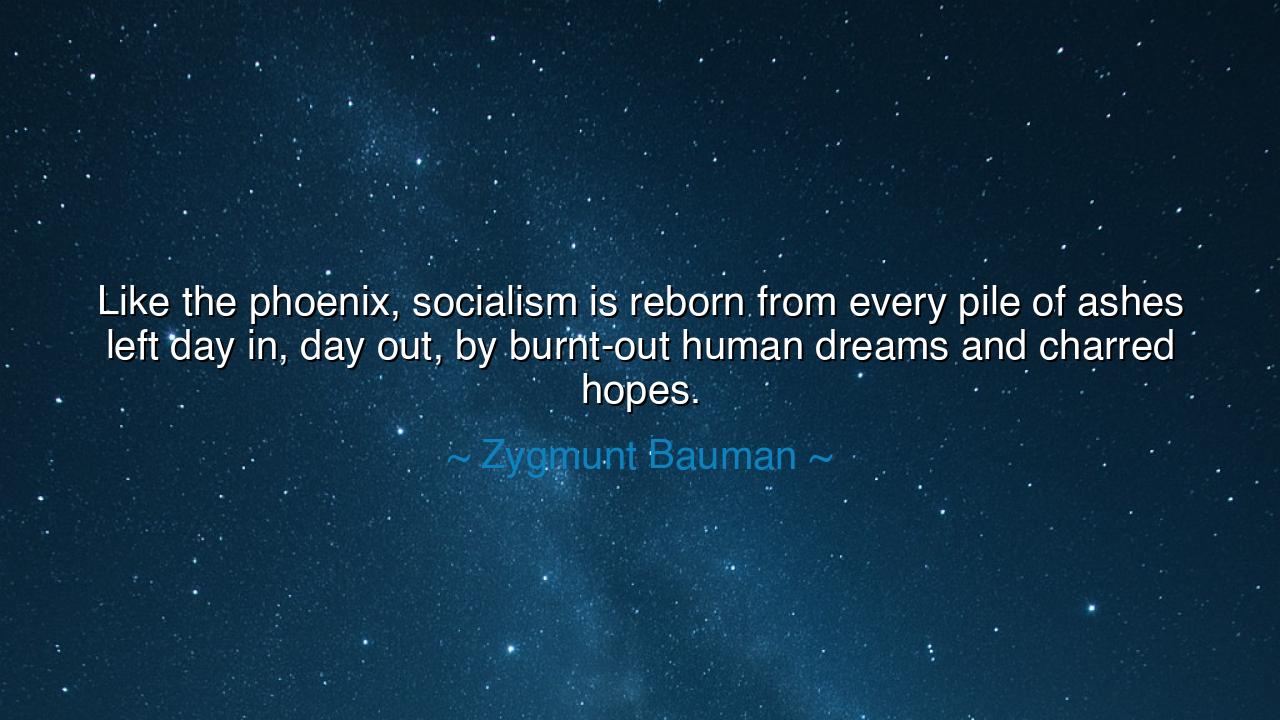
Like the phoenix, socialism is reborn from every pile of ashes
Like the phoenix, socialism is reborn from every pile of ashes left day in, day out, by burnt-out human dreams and charred hopes.






“Like the phoenix, socialism is reborn from every pile of ashes left day in, day out, by burnt-out human dreams and charred hopes.” Thus spoke Zygmunt Bauman, the philosopher of liquid modernity, who peered deeply into the heart of human society and saw both its despair and its resilience. His words are not merely about politics, but about the eternal rhythm of human aspiration—the rise and fall, the burning and rebirth of hope. In this single image of the phoenix, Bauman captures the paradox of our collective spirit: that even when our ideals are reduced to ashes, something within humanity refuses to die.
The phoenix, that immortal bird of legend, has long been the emblem of renewal. In the myths of Egypt, Greece, and Persia, it burns itself in flames only to rise again, radiant and renewed, from its own destruction. Bauman uses this symbol to describe socialism, not as a fixed ideology or doctrine, but as a recurring dream—a moral yearning for justice, equality, and human dignity. Time and again, systems that promised fairness have crumbled under their own imperfections. Yet from their ruin, the idea of fairness rises again. Each generation rekindles the hope that life can be more than a competition of greed, that society can still be governed by compassion rather than consumption.
Bauman’s own life bore witness to the truth of his metaphor. Born in Poland, he lived through the dark tides of the twentieth century—the rise of fascism, the terror of war, the false dawn of Stalinism, and the restless turbulence of capitalism. He saw entire worlds destroyed, ideologies shattered, and faith in progress betrayed. Yet even in the ruins, he discerned a pattern: from every collapse of belief, new visions emerged. The burnt-out dreams of one age became the fuel of another’s renewal. Humanity, it seemed, was condemned—and blessed—to dream again.
Consider the story of post-war Europe. When the continent lay in ashes after the Second World War, many declared that faith in humanity itself had died. But from that devastation arose new forms of cooperation—the welfare state, the United Nations, the movement toward collective peace. Though imperfect, these efforts embodied the phoenix spirit Bauman describes: the will to rebuild, to seek justice, even when injustice seems inevitable. The same can be said of countless social movements—the civil rights struggles, the fight against colonialism, the demands for workers’ dignity. Each was born from despair, yet each gave birth to a new dawn.
In Bauman’s vision, socialism is not merely a political system—it is a moral instinct, a continual rebellion against cruelty and inequality. Even when the structures that claim its name fall into corruption or collapse, the underlying desire survives. This is why, he says, it rises again “day in, day out”—because the world continually produces new ashes: broken promises, disappointed dreams, and human suffering. And wherever there is suffering, there will be those who imagine a better order. The phoenix burns because it must, but it also returns because the fire is never extinguished.
Yet there is wisdom and warning in Bauman’s image. The phoenix does not rise unchanged—it is reborn, but not reborn innocent. The ashes remind us that every new dream carries the scars of the past. To seek justice without humility, to build anew without remembering the ruins, is to repeat the cycle endlessly. Bauman urges us to learn from the ashes, not to deny them. Progress, if it is to be real, must be tempered by memory and guided by compassion. The fire of idealism must be joined with the clarity of wisdom.
Therefore, my children of the future, learn from this teaching. When the world around you burns—when your dreams are reduced to dust—do not despair. For the phoenix within humanity has not perished. Let your disillusionment become the soil of understanding, and your pain the forge of renewal. Dream again, but dream wisely. Build again, but build with open eyes. The cycle of hope and ruin is eternal—but so too is the courage to begin anew. In this, Bauman’s words are both prophecy and promise: that as long as there are hearts that care, the fire will never die, and from the ashes of every age, justice will rise once more.






AAdministratorAdministrator
Welcome, honored guests. Please leave a comment, we will respond soon